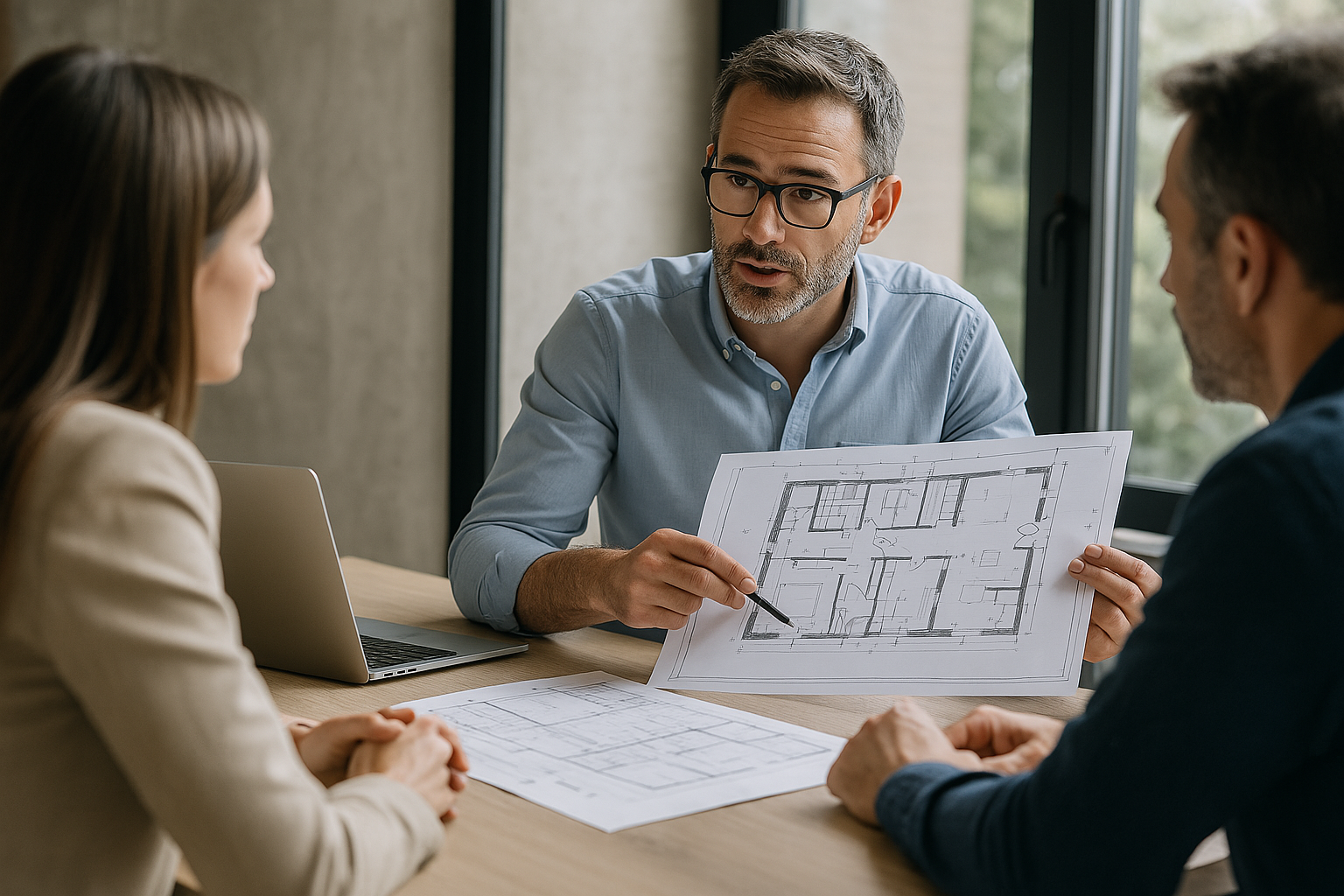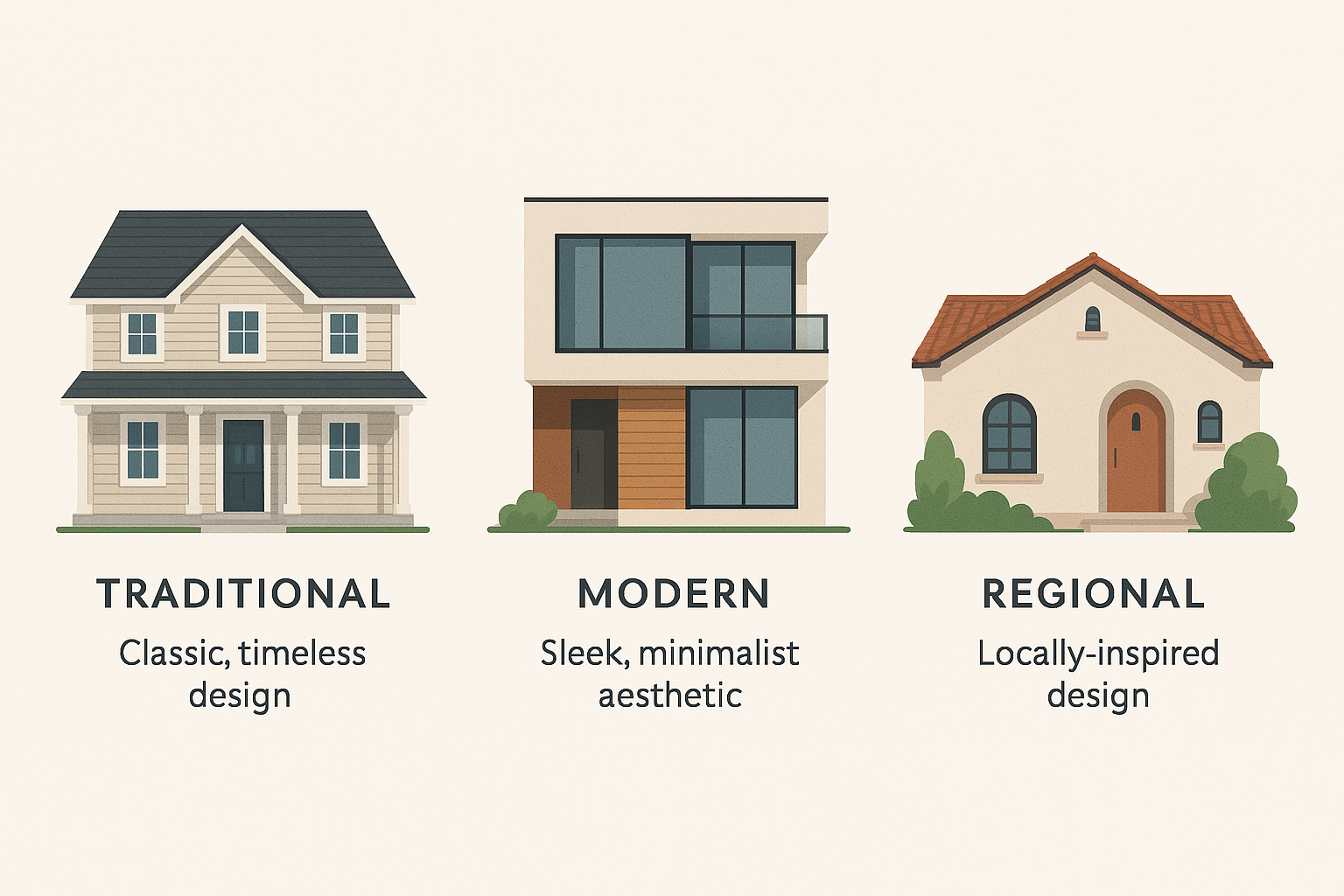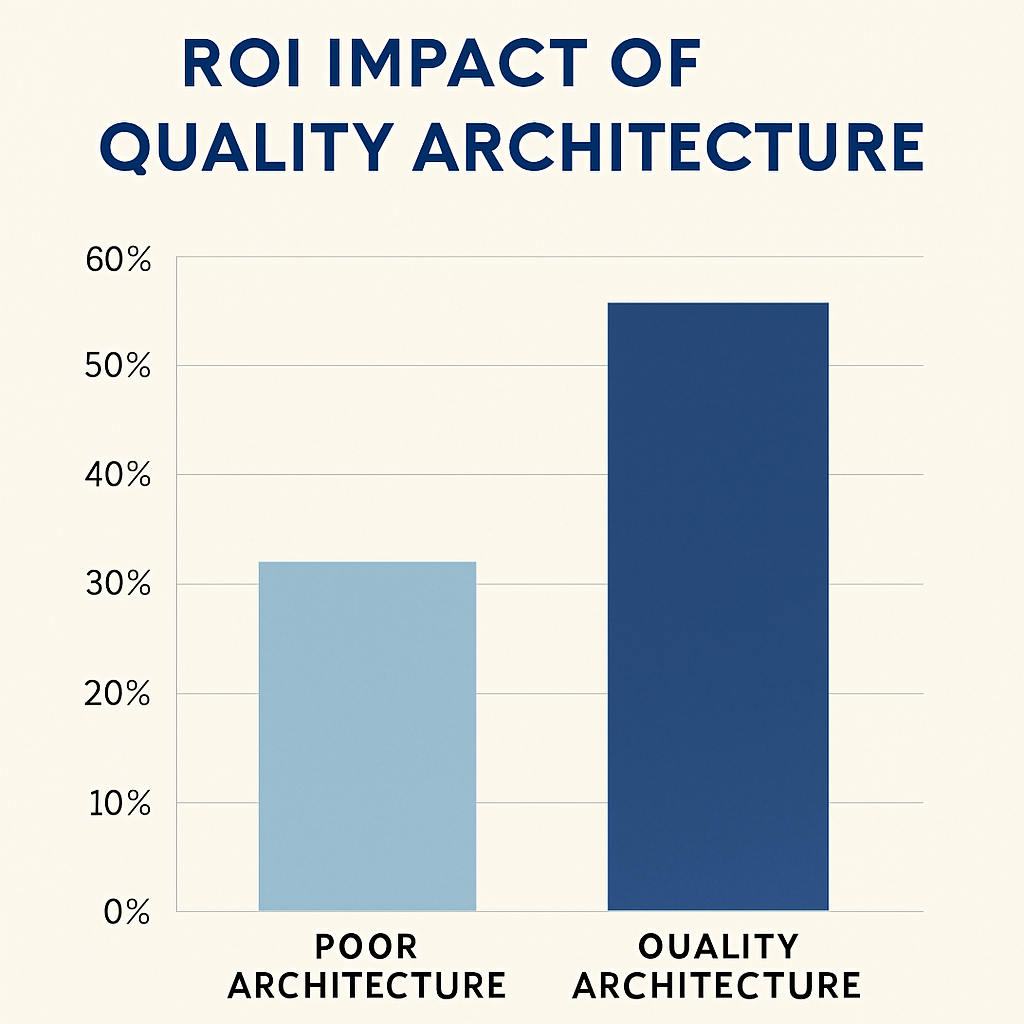
Check out our app!
Explore more features on mobile.
23 Essential Questions to Ask an Architect Before Hiring (2025 Guide)
Hiring the right architect can be the difference between a successful real estate project and a costly nightmare. Whether you’re building a custom home, renovating an investment property, or developing a commercial space, the architect you choose will significantly impact your project’s outcome, timeline, and budget. In this comprehensive guide, we’ll explore the crucial questions every property owner and investor should ask before signing a contract, complete with expert insights, real-world cost comparisons, and strategic advice that aligns with Builds and Buys’ step-by-step approach to real estate success.

Understanding Architectural Services & Value
Before diving into specific questions, it’s important to understand the scope of architectural services and how they add value to your real estate project. According to the American Institute of Architects (AIA), architectural services typically represent only about 5-10% of the total project cost, yet influence nearly 100% of how your building looks, functions, and performs over time.
1. “What is the full scope of services you provide?”
Beyond just drawing plans, architects can offer:
- Pre-design services (programming, feasibility studies, site analysis)
- Schematic design and design development
- Construction documentation
- Bidding/negotiation with contractors
- Construction administration
- Post-construction services
Understanding the comprehensive services available helps you determine what you need for your specific project. Some architects offer end-to-end services, while others specialize in specific phases.
2. “Can I see examples of your previous work similar to my project?”
Reviewing an architect’s portfolio reveals their experience with projects similar to yours in:
- Scale and budget
- Property type (residential, commercial, multi-family)
- Style and aesthetic approach
- Specific challenges (historic renovations, sustainable design, etc.)
Request to see before-and-after photos, floor plans, and elevation drawings of completed projects. If possible, ask to visit a completed project or speak with previous clients.
3. “Are you licensed, insured, and certified in this jurisdiction?”
Verify credentials to ensure the architect:
- Holds a valid architectural license in your state/jurisdiction
- Carries professional liability insurance (also called errors and omissions insurance)
- Has any specialized certifications relevant to your project (LEED for sustainable design, historic preservation certification, etc.)
Working with properly licensed and insured professionals protects your investment and ensures compliance with local building codes.
Financial & Budget Questions
Understanding the financial aspects of working with an architect is crucial for project planning and avoiding unexpected costs. According to industry data, clear financial agreements with architects can save property owners an average of 15-20% on overall project costs through better budget management and reduced change orders.
4. “How do you structure your fees?”
Architectural fees typically follow one of these structures:
- Percentage of construction costs: Typically ranges from 8-15% for residential projects, 4-12% for commercial projects
- Hourly rates: Usually between $150-$400 per hour depending on the firm’s reputation and location
- Fixed fee: A predetermined amount for clearly defined scope of work
- Hybrid approach: Combining different fee structures for different project phases
5. “What does your fee include and exclude?”
Get specifics on what services are included in the base fee and what might incur additional charges, such as:
| Typically Included | Often Additional Fees |
|---|---|
|
|
6. “What are your payment terms and schedule?”
Typical payment structures include:
- Retainer/initial deposit (often 10-15% of estimated fee)
- Progress payments tied to project milestones
- Monthly billing based on percentage of work completed
- Final payment upon project completion
Ask about their policies regarding late payments, stopped projects, and change order fees.
7. “How do you approach budget management throughout the project?”
Strong architects have systematic approaches to budget management, including:
- Regular cost estimates at design milestones
- Value engineering options to reduce costs without sacrificing quality
- Systems for tracking and approving changes that impact the budget
- Transparent communication about potential cost increases
Ask for specific examples of how they’ve handled budget challenges on previous projects.
Design Philosophy & Approach
Understanding an architect’s design philosophy helps determine if they’re the right fit for your vision and can add value to your real estate investment through thoughtful, marketable design solutions.
8. “What is your design philosophy and approach?”
This question reveals:
- Their guiding principles and values in architecture
- How they balance aesthetics with functionality
- Their approach to contextual design (how buildings relate to surroundings)
- Their perspective on sustainable/green design
Listen for alignment with your own values and project goals. The architect should articulate a clear philosophy that resonates with your vision.
9. “Do you have a signature style or do you adapt to client preferences?”
Some architects are known for a distinctive style, while others are more chameleon-like in adapting to client preferences. Neither approach is inherently better, but compatibility with your vision is crucial.
If you’re developing properties for resale, market research indicates that regionally-appropriate designs with contemporary elements typically yield 10-12% higher returns than highly stylized or unusual designs.

10. “How do you approach sustainable design and energy efficiency?”
With energy codes tightening and market demand for sustainable properties increasing, ask about:
- Experience with energy-efficient building systems
- Knowledge of green building certifications (LEED, Passive House, etc.)
- Approaches to site orientation, daylighting, and natural ventilation
- Cost-benefit analysis of sustainable features
Properties with documented energy-efficient features command 4-6% higher prices and sell up to 20% faster than comparable conventional properties, according to recent market studies.
Project Management & Timeline
Time is money in real estate development. Understanding how an architect manages projects and timelines can significantly impact your investment returns.
11. “What is your typical design process and timeline?”
The architect should outline a clear process with defined phases and milestones:
| Phase | Typical Duration | Key Deliverables |
|---|---|---|
| Pre-Design | 2-4 weeks | Program requirements, site analysis, feasibility studies |
| Schematic Design | 4-8 weeks | Preliminary drawings, spatial relationships, basic materials |
| Design Development | 6-12 weeks | Refined drawings, material selections, systems integration |
| Construction Documents | 8-16 weeks | Detailed drawings and specifications for building permits and construction |
| Bidding/Negotiation | 3-6 weeks | Contractor selection, bid evaluation, contract preparation |
| Construction Administration | Varies by project | Site visits, responding to RFIs, reviewing shop drawings |
Ask for a customized timeline specific to your project type and scale.
12. “When will my project be completed?”
Beyond the design timeline, discuss:
- Realistic permitting timeframes in your jurisdiction
- Construction duration estimates
- Critical path considerations and potential bottlenecks
- Strategies for keeping the project on schedule
Industry benchmarks suggest that well-managed architectural projects complete on schedule 75% of the time, while poorly managed projects meet deadlines only 30% of the time.
13. “Do you offer project management services during construction?”
Construction administration (CA) services typically include:
- Regular site visits to monitor construction quality and adherence to plans
- Reviewing contractor submittals and shop drawings
- Responding to RFIs (Requests for Information)
- Issuing supplemental drawings or clarifications as needed
- Reviewing payment applications
- Managing change orders
Data shows that projects with architectural oversight during construction experience 42% fewer change orders and 35% fewer defects, resulting in significant cost savings.
Collaboration & Communication
The success of your project depends heavily on effective collaboration and clear communication with your architect.
14. “Who will be my primary contact and who will actually work on my project?”
Understanding the team structure is essential:
- Will you work directly with the principal architect or a project manager?
- Who will handle day-to-day communications?
- Who will be designing your project (could be different from the person you’re meeting)?
- What is the staffing plan for your project?
Be cautious if the principal architect is heavily involved in sales but delegates actual design work entirely to junior staff without proper oversight.
15. “How and how often will we communicate throughout the project?”
Establish clear communication protocols:
- Regular meeting schedule (weekly, biweekly, monthly)
- Preferred communication methods (email, phone, project management software)
- Decision-making process and approval protocols
- Response time expectations for questions and issues
Projects with structured communication plans experience 80% fewer misunderstandings and conflicts than those without clear protocols.
16. “Can you provide references from previous clients?”
When contacting references, ask specific questions about:
- Communication style and responsiveness
- Ability to listen and incorporate feedback
- How they handled challenges or disagreements
- Budget management and transparency
- Overall satisfaction with the completed project
Always speak with at least three references, ideally with projects similar to yours in scope and budget.
Technical Expertise & Specialization
Different project types require different expertise. Ensure your architect has the specific knowledge needed for your particular real estate venture.
17. “Do you have experience with my specific project type?”
Different building types have unique requirements:
- Single-family residential vs. multi-family
- Commercial retail vs. office space
- Healthcare facilities
- Hospitality
- Mixed-use developments
- Historic renovations
Ask about their experience with building codes, zoning regulations, and industry standards specific to your project type.
18. “Can you supply 3D drawings and visualizations?”
Modern design tools provide valuable visualization options:
- 3D renderings (photorealistic images of the proposed design)
- Virtual walkthroughs
- Building Information Modeling (BIM)
- Virtual reality (VR) or augmented reality (AR) visualization
These tools help you better understand the proposed design and can significantly reduce costly changes during construction by identifying issues early.
19. “Do you have established relationships with contractors and other consultants?”
Strong professional networks can benefit your project through:
- Streamlined coordination between design and construction teams
- Access to reliable contractors familiar with the architect’s documentation style
- Integrated expertise from specialized consultants (structural, mechanical, electrical engineers)
- More accurate preliminary cost estimating
Ask if they have preferred contractors they recommend or if they’re open to working with contractors you select.
20. “How do you handle permitting and code compliance?”
Navigating regulatory requirements is a crucial architectural service:
- Experience with local zoning regulations and building codes
- Relationships with local building departments
- Track record of successful permitting
- Approach to addressing code challenges
An architect with strong regulatory knowledge can prevent costly delays and redesigns during the permitting process, which typically saves 6-8 weeks in the development timeline.
The Step-by-Step Guide to Architect Selection
At Builds and Buys, we recommend following this structured approach to selecting the right architect for your real estate project:
Step-by-Step Builds: Architect Selection Process
- Define your project goals and requirements – Create a detailed project brief including budget, timeline, and design objectives
- Research potential architects – Look for firms with experience in similar projects in your area
- Review portfolios and credentials – Evaluate their past work, licenses, and professional affiliations
- Conduct initial interviews – Ask the 23 questions outlined in this guide
- Check references thoroughly – Speak with past clients about their experiences
- Visit completed projects – See the architect’s work firsthand if possible
- Evaluate proposals – Compare scope, fees, timelines, and approaches
- Review contract terms – Understand all terms and conditions before signing
21. “What makes you the right architect for my project?”
This question gives architects an opportunity to articulate their unique value proposition. Listen for:
- Specific expertise relevant to your project type
- Understanding of your specific goals and challenges
- Problem-solving approaches that align with your priorities
- Chemistry and communication style compatibility
The right architect should demonstrate genuine enthusiasm for your project and clear alignment with your vision.
22. “Do you offer additional services beyond traditional architectural design?”
Many architecture firms provide valuable supplementary services:
- Interior design and FF&E (furniture, fixtures, and equipment) selection
- Landscape design
- Lighting design
- Sustainability consulting
- Post-occupancy evaluation
- Facilities management support
These integrated services can create more cohesive designs and potentially reduce the need for additional consultants.
23. “How will you ensure my project is successful?”
This final question helps reveal the architect’s:
- Definition of project success (should align with yours)
- Quality control processes
- Risk management strategies
- Commitment to client satisfaction
- Problem-solving approaches
The best architects will have clear methodologies for ensuring project success rather than vague assurances.
ROI Analysis: The Financial Impact of the Right Architect
Selecting the right architect is ultimately a financial decision that affects your real estate investment returns. Industry research shows that quality architectural services typically yield returns far exceeding their cost:

[Graph: ROI Impact of Quality Architecture]
Key financial benefits include:
- Reduced construction costs: Well-detailed drawings and specifications typically result in 8-12% lower construction bids due to reduced uncertainty and risk premiums
- Fewer change orders: Comprehensive design development reduces expensive mid-construction changes, typically saving 5-8% of construction costs
- Enhanced property value: Thoughtful architectural design typically adds 12-15% to property resale value compared to builder-grade construction
- Operational savings: Energy-efficient design can reduce ongoing utility costs by 20-30% over the building’s lifecycle
- Faster lease-up or sale: Distinguished architectural design reduces time-on-market by an average of 25-40% for commercial and high-end residential properties
The cumulative financial impact of these benefits can significantly outweigh architectural fees, with studies showing that quality architectural services yield an average ROI of 300-500% over the life of a property.
Conclusion: Investing in Architectural Excellence
Choosing the right architect is one of the most consequential decisions you’ll make in your real estate investment journey. By asking these 23 essential questions, you’ll gain valuable insights into an architect’s capabilities, approach, and fit for your specific project needs.
Remember that architectural services represent a relatively small percentage of your overall project cost but influence nearly every aspect of your building’s functionality, aesthetics, and long-term value. Investing time in a thorough selection process pays dividends throughout the project lifecycle and long into the future.
At Builds and Buys, we believe that successful real estate investment is about making informed decisions at every stage. Whether you’re building your dream home, renovating an investment property, or developing a commercial project, partnering with the right architect sets a solid foundation for success.
Real Estate News And Knowledge
Stay informed with the latest trends, insights, and updates in the real estate world.
Your Tools
Access your tools to manage tasks, update your profile, and track your progress.
Collaboration Feed
Engage with others, share ideas, and find inspiration in the Collaboration Feed.



